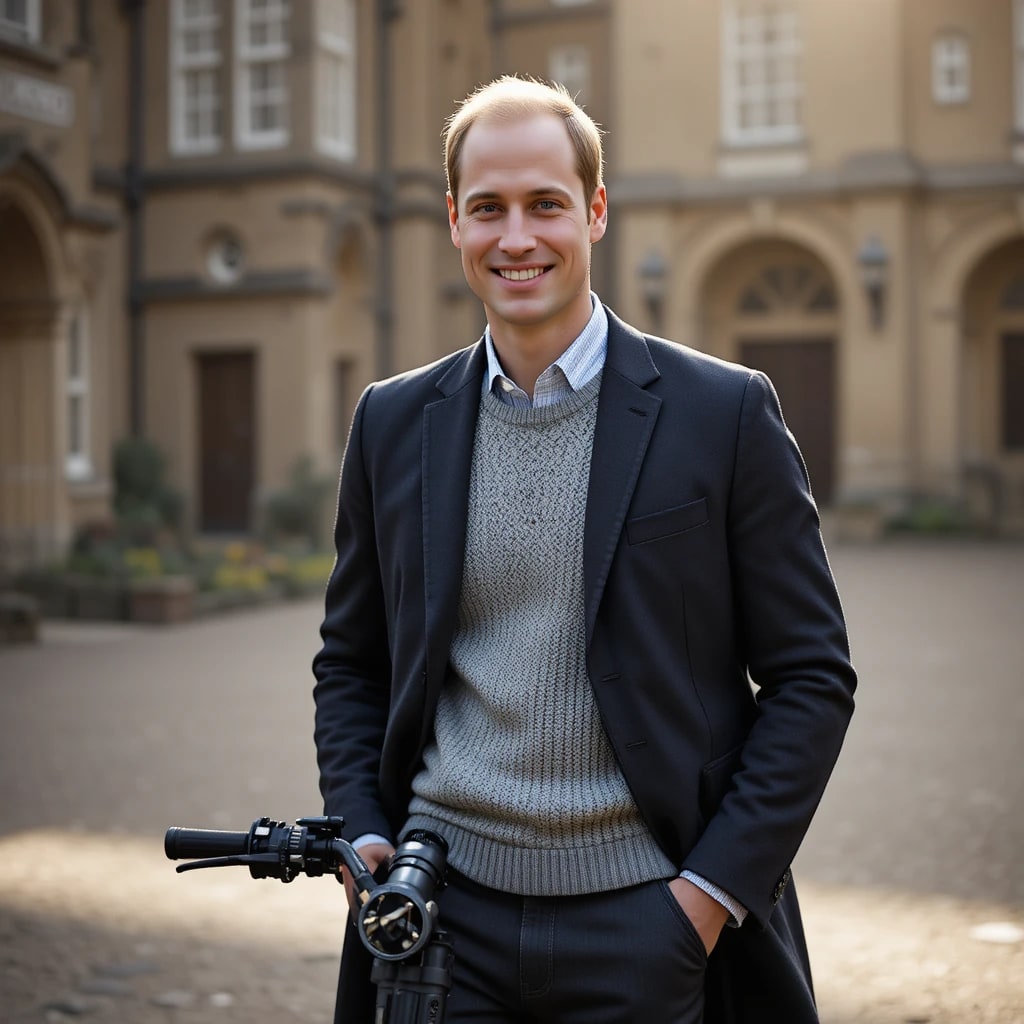Sometimes the loudest message comes from the quietest voice.
When Prince William appeared on The Reluctant Traveler with Eugene Levy, the world expected another polished royal segment—safe, scripted, and formal. But what unfolded was something entirely different. It was a rare, human glimpse of a future king who knows the weight of his crown but wears it lightly. And it quietly rewrote the story his brother, Prince Harry, has been shouting for years.
The scene opened not with pomp or ceremony, but with humor. Levy stood in Windsor Castle’s courtyard, expecting the traditional royal arrival—black cars, security, precision timing. Instead, William rolled in late on an electric scooter with a flat tire. No entourage, no performance—just a man running behind schedule, smiling through it.
That single moment said more about William’s character than a hundred press releases ever could. He wasn’t performing royal perfection. He was living real imperfection. And that’s where the brilliance lay.
While Harry and Meghan have spent years curating every frame of their story—from emotional documentaries to explosive interviews—William allowed a flat tire to stay in the final cut. It wasn’t an oversight; it was a statement. He didn’t need to polish reality to connect with people. He trusted authenticity to do the work for him.
Throughout the conversation, William spoke about his family, his hopes for the monarchy, and the lessons of the past. But he didn’t dramatize them. He didn’t point fingers or revisit old wounds. He simply reflected—with the calm confidence of a man who’s endured public pain without letting it define him.
He mentioned Harry just once.
No criticism, no bitterness—just a quiet acknowledgment wrapped in restraint. And somehow, that one sentence echoed louder than any royal “tell-all” could. It showed that William has learned the rare art of responding without reacting.
When he spoke about change, he wasn’t calling for rebellion. He was talking about evolution—gentle, lasting change that honors tradition while healing what’s broken. “I want my children to be proud of what I build,” he said. It was a simple line, but it carried the weight of generations. It wasn’t just a vision for the crown—it was a promise to his family and his future.
The contrast between the brothers couldn’t be clearer. While Harry has often seemed consumed by resentment toward the institution that shaped him, William looked at that same legacy and chose responsibility over rebellion. Where Harry found trauma, William found purpose.
It’s not that one brother suffered and the other didn’t—they both did. But William’s way of handling it has been remarkably different. His strength doesn’t come from defiance or headlines. It comes from composure. He doesn’t have to shout to be heard.
And that composure wasn’t cold. It was warm, self-aware, and surprisingly funny. He teased Eugene Levy about his “tourist curiosity,” laughed about his own late arrival, and even joked that Levy might deserve a portrait in Windsor someday. These weren’t rehearsed quips—they were genuine, unguarded moments.
That’s what people noticed. Not perfection. Not power. Humanity.
Even his choice of platform was deliberate. Apple TV+ isn’t just another streaming service—it’s known for quality, depth, and credibility. William didn’t go for sensationalism or a quick paycheck. Reports suggest he took no personal fee, requesting the money go to charity instead. That gesture alone stood in stark contrast to the commercial whirlwind that has surrounded Harry and Meghan’s media ventures.
The episode subtly rebalanced the royal narrative without attacking anyone. William didn’t say, “I’m the better brother.” He didn’t need to. His quiet professionalism did the talking. His grounded presence spoke volumes about what modern leadership looks like—steady, measured, and kind.
But the emotional weight came when he spoke about his grandmother, Queen Elizabeth II.
He described visiting her at Windsor during his school years—having tea, sharing laughter, and always leaving with a full stomach. The memory wasn’t about duty or discipline. It was about affection. And in that small, tender story, William revealed the soul of the monarchy he wants to build—one rooted not in power, but in connection.
You could sense the grief and reverence in his tone, a grandson remembering not a monarch, but a mentor. That moment of honesty—unfiltered and nostalgic—was more powerful than any royal statement in recent memory. It reminded the world that behind the ceremonies and scandals, there are real people carrying history on their shoulders.
William didn’t hide his fatigue. He admitted that balancing family, public expectations, and royal duties can be overwhelming. His candor didn’t make him weaker—it made him relatable. Viewers could see the subtle exhaustion in his eyes, the trace of heartache left by years of tension and public scrutiny. But instead of bitterness, there was grace.
That grace—steady, understated, and deeply human—is what separates him from the noise.
He doesn’t fight the media storm; he stands still until it passes. He doesn’t need to prove himself. The truth does it for him.
By the time the interview ended, Eugene Levy summed it up perfectly: “Nice, open, human.”
Three words that captured what Harry’s years of interviews never quite managed to show.
Because sometimes leadership isn’t about speaking louder—it’s about speaking less, but meaning more. And in those thirty minutes, William reminded the world that quiet confidence, empathy, and dignity still matter.
He didn’t win through confrontation. He won through composure.
And in doing so, he gave the world a glimpse—not just of a future king, but of the kind of man who deserves the crown.
